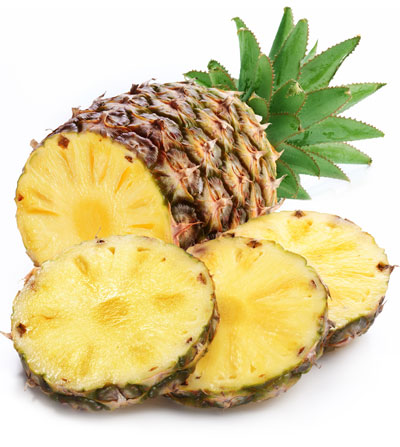





1. Pineapple Facts
2. Types of Pineapple
3. Nutritional Value of Pineapple
4. Health Benefits of Pineapple
The pineapple (Ananas comosus) is a tropical plant with an edible fruit; it is the most economically significant plant in the family Bromeliaceae.
The pineapple is indigenous to South America, where it has been cultivated for many centuries. The introduction of the pineapple plant to Europe in the 17th century made it a significant cultural icon of luxury. Since the 1820s, pineapple has been commercially grown in greenhouses and many tropical plantations. The fruit, particularly its juice, has diverse uses in cuisines and desserts.
Pineapples grow as a small shrub; the individual flowers of the unpollinated plant fuse to form a multiple fruit. The plant normally propagates from the offset produced at the top of the fruit or from a side shoot and typically matures within a year.
History and Origin
Pineapples originated in the Paraná–Paraguay River basin of South America, where they were first domesticated by indigenous peoples like the Mayas and Aztecs. European explorers, including Christopher Columbus in 1493, encountered the fruit in the Caribbean and later spread it globally through trade routes to Africa, Asia, and the Pacific. Today, pineapples are grown in tropical and subtropical regions worldwide, with major producers including Thailand, the Philippines, China, and Brazil.
- • Pure Gold Family
- • MD2
- • 73-50
- • Piñata
- • Queen
- • Smooth Cayenne
- • Aus-Jubilee
- • Mareeba Sweet/Gold
The main types of pineapples grown and sold in Australia are the Pure Gold varieties, which include the MD2 and 73-50 types. Other varieties like the Piñata, Queen, and Smooth Cayenne are also available, with some, like the Queen, being popular for fresh eating due to their sweet flavour and low acidity.
Pure Gold Pineapples
MD2: Often called "Summer Fruit" and sold under "Summer Sweet Tags," this variety is known for its sweetness and golden flesh.
73-50: Grown year-round, this is another sweet variety with a golden flesh.
Pure Gold Family: This is a brand that includes a range of sizes, such as Mini Gold, Extra Large Gold, and Queensland Gold.
Other varieties
Piñata: A low-acid, sweet, and succulent variety that is widely available in Australian supermarkets.
Queen: Known for its pleasant aroma and flavour, this variety is best eaten fresh rather than canned.
Smooth Cayenne: A large, popular variety that balances sweetness and acidity well, making it versatile for both sweet and savory dishes.
Aus-Jubilee: A new, dual-purpose variety selected for high sugar and vitamin C content, aromatic flavour, and firm flesh.
Mareeba Sweet/Gold: These are cultivars bred for low acid levels and a true pineapple taste.
Fruit ” Pineapple ” ( Nutritional value )
Nutritional value per 100 g
Pineapple, raw, all varieties
|
Nutrient ( Proximate’s )
|
Unit
|
Value
|
Daily Value %
|
|
Energy
|
kcal
|
50
|
2.5%
|
|
Protein
|
g
|
0.54
|
1%
|
|
Total lipid (fat)
|
g
|
0.12
|
0.1%
|
|
Carbohydrate, by difference
|
g
|
13.12
|
4.7%
|
|
Fiber, total dietary
|
g
|
1.4
|
5%
|
|
Sugars, total
|
g
|
9.85
|
|
|
Minerals
|
|||
|
Calcium, Ca
|
mg
|
13
|
1%
|
|
Iron, Fe
|
mg
|
0.29
|
1.6%
|
|
Magnesium, Mg
|
mg
|
12
|
2.8%
|
|
Phosphorus, P
|
mg
|
8
|
0.6%
|
|
Potassium, K
|
mg
|
109
|
2.1%
|
|
Sodium, Na
|
mg
|
1
|
0.04%
|
|
Zinc, Zn
|
mg
|
0.12
|
1%
|
|
Copper, Cu
|
mg
|
0.110
|
12.2%
|
|
Manganese, Mn
|
mg
|
0.927
|
40.3%
|
|
Selenium, Se
|
mcg
|
0.1
|
0.1%
|
|
Vitamins
|
|||
|
Vitamin C, total ascorbic acid
|
mg
|
47.8
|
53.1.6%
|
|
Thiamin (B-1)
|
mg
|
0.079
|
6.5%
|
|
Riboflavin (B-2)
|
mg
|
0.032
|
2.4%
|
|
Niacin (B-3)
|
mg
|
0.500
|
3.1%
|
|
Pantothenic acid (B-5)
|
mg
|
0.213
|
4.2%
|
|
Vitamin B-6
|
mg
|
0.112
|
6.5%
|
|
Vitamin B-12
|
mg
|
0.00
|
|
|
Folate DFE (dietary folate) (B-9)
|
mcg
|
18
|
4.5%
|
|
Vitamin A, RAE (retinol)
|
mcg
|
3
|
0.3%
|
|
Vitamin E (alpha-tocopherol)
|
mg
|
0.02
|
0.4%
|
|
Vitamin D (D2 + D3)
|
mcg
|
0
|
|
|
Vitamin K (phylloquinone)
|
mcg
|
0.7
|
0.5%
|
|
Lipids
|
|||
|
Saturated Fatty Acids
|
g
|
0.009
|
0.04%
|
|
Monounsaturated Fatty Acids
|
g
|
0.013
|
|
|
Polyunsaturated Fatty Acids
|
g
|
0.040
|
|
|
Trans Fatty Acids
|
g
|
0.000
|
|
|
Carotenoids
|
|||
|
Beta-Carotene
|
mcg
|
35
|
|
|
Beta-Cryptoxanthin
|
mcg
|
0
|
|
|
Lutein + zeaxanthin
|
mcg
|
0
|
|

|
Reference Values are based on a 2,000 Calorie Intake, for Adults and Children 4 or More Years of Age. Your daily values may be higher or lower depending on your calorie needs.
|
|
Percentages are roughly approximated using (RDA) Recommended Dietary Allowances for adults. Source: Nutrient Database – USDA (United States Department of Agriculture)
|
|
Reference Values for Nutrition – FDA U.S. Food and Drug Administration
|
Pineapple Nutritional Value
Pineapples offer numerous health benefits due to their rich content of vitamins, minerals, antioxidants, and enzymes. They are an excellent source of vitamin C for immune support, antioxidants like flavonoids to protect against oxidative stress, and fiber for healthy digestion. Additionally, the enzyme bromelain found in pineapple aids protein digestion and has anti-inflammatory properties. They are also low in calories, making them a healthy snack option.
- SUPPORTS HEART HEALTH
Pineapple supports heart health through its potassium and fiber content, which help regulate blood pressure and lower cholesterol respectively. Additionally, the enzyme bromelain in pineapple may prevent blood clots and reduce inflammation in blood vessels, while its antioxidants combat oxidative stress and protect heart tissue. - AIDS DIGESTION
Pineapples are the only known food source of bromelain, a combination of enzymes that digest protein. That's why pineapple works as a meat tenderizer: The bromelain breaks down the protein and softens the meat. In your body, bromelain makes it easier for you to digest food and absorb it. - RICH IN ANTIOXIDANTS
Pineapples are rich in antioxidants like flavonoids and phenolic acids that help protect cells from damage caused by free radicals. Consuming these antioxidants may lower the risk of chronic diseases such as heart disease and diabetes. Additionally, pineapple contains an enzyme called bromelain, which has anti-inflammatory properties and aids digestion by breaking down proteins. - PROMOTES RECOVERY
Pineapple promotes recovery due to its anti-inflammatory properties from the enzyme bromelain and its high content of vitamin C and other nutrients. Bromelain helps reduce inflammation, swelling, and pain from injuries and surgery, while vitamin C aids in wound healing by supporting collagen production. Additionally, pineapple provides carbohydrates for energy and minerals like potassium and magnesium, which support muscle recovery after exercise.

- BOOSTS IMMUNE SYSTEM
Pineapple boosts the immune system due to its high vitamin C content and the presence of bromelain. Vitamin C supports immune function and helps the body fight infection, while bromelain, a digestive enzyme, has anti-inflammatory effects and can increase infection-fighting white blood cells. - HAS ANTI-INFLAMMATORY PROPERTIES
Pineapple has anti-inflammatory properties, primarily due to the enzyme bromelain, which is a mix of protein-digesting enzymes. These properties can help reduce inflammation associated with injuries, infections, and conditions like osteoarthritis, and may aid in muscle recovery. - PROVIDES ESSENTIAL NUTRIENTS
Pineapple provides essential nutrients, including vitamin C, manganese, and fiber, which support the immune system, aid digestion, and provide antioxidant protection. It also contains other vitamins and minerals like copper, thiamin (vitamin B1), vitamin B6, and potassium. Additionally, fresh pineapple contains an enzyme called bromelain, which is known for its anti-inflammatory properties and role in protein digestion - HELPS WITH WEIGHT MANAGEMENT
Pineapple can help with weight management due to its high-water content, which aids hydration, and fiber, which promotes fullness. It also contains bromelain, an enzyme that may help with fat digestion, and vitamin C, which can boost metabolism. While studies on pineapple's anti-obesity effects are promising, more research is needed, particularly on how pineapple juice and vinegar affect fat metabolism in humans.
References
Nutrient Database – USDA (United States Department of Agriculture)
Reference Values for Nutrition – FDA U.S. Food and Drug Administration
Boosts immune system - Pineapple boosts the immune system due to its high vitamin C content and the presence of bromelain. Vitamin C supports immune function and helps the body fight infection, while bromelain, a digestive enzyme, has anti-inflammatory effects and can increase infection-fighting white blood cells.
Aids digestion - Pineapples are the only known food source of bromelain, a combination of enzymes that digest protein. That's why pineapple works as a meat tenderizer: The bromelain breaks down the protein and softens the meat. In your body, bromelain makes it easier for you to digest food and absorb it.
Rich in antioxidants - Pineapples are rich in antioxidants like flavonoids and phenolic acids that help protect cells from damage caused by free radicals. Consuming these antioxidants may lower the risk of chronic diseases such as heart disease and diabetes. Additionally, pineapple contains an enzyme called bromelain, which has anti-inflammatory properties and aids digestion by breaking down proteins.
Promotes recovery - Pineapple promotes recovery due to its anti-inflammatory properties from the enzyme bromelain and its high content of vitamin C and other nutrients. Bromelain helps reduce inflammation, swelling, and pain from injuries and surgery, while vitamin C aids in wound healing by supporting collagen production. Additionally, pineapple provides carbohydrates for energy and minerals like potassium and magnesium, which support muscle recovery after exercise.
Supports heart health - Pineapple supports heart health through its potassium and fiber content, which help regulate blood pressure and lower cholesterol respectively. Additionally, the enzyme bromelain in pineapple may prevent blood clots and reduce inflammation in blood vessels, while its antioxidants combat oxidative stress and protect heart tissue.
Has anti-inflammatory properties - Pineapple has anti-inflammatory properties, primarily due to the enzyme bromelain, which is a mix of protein-digesting enzymes. These properties can help reduce inflammation associated with injuries, infections, and conditions like osteoarthritis, and may aid in muscle recovery.
Provides essential nutrients - Pineapple provides essential nutrients, including vitamin C, manganese, and fiber, which support the immune system, aid digestion, and provide antioxidant protection. It also contains other vitamins and minerals like copper, thiamin (vitamin B1), vitamin B6, and potassium. Additionally, fresh pineapple contains an enzyme called bromelain, which is known for its anti-inflammatory properties and role in protein digestion.
Helps with weight management - Pineapple can help with weight management due to its high-water content, which aids hydration, and fiber, which promotes fullness. It also contains bromelain, an enzyme that may help with fat digestion, and vitamin C, which can boost metabolism. While studies on pineapple's anti-obesity effects are promising, more research is needed, particularly on how pineapple juice and vinegar affect fat metabolism in humans.
